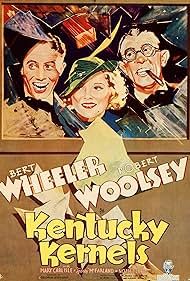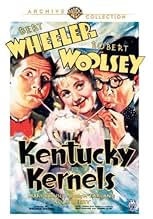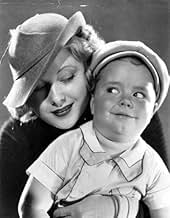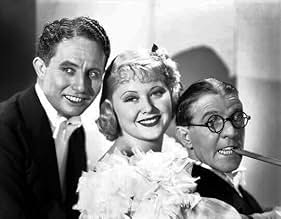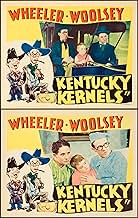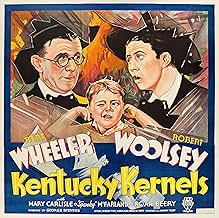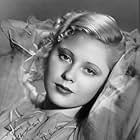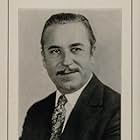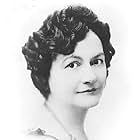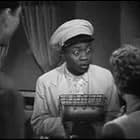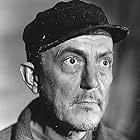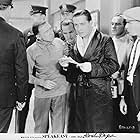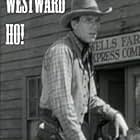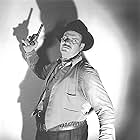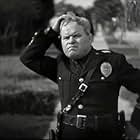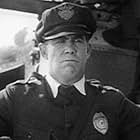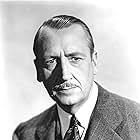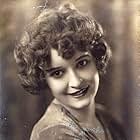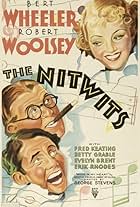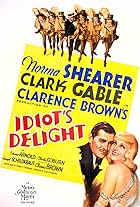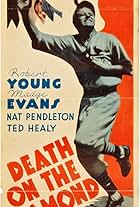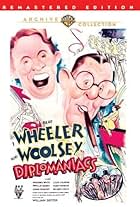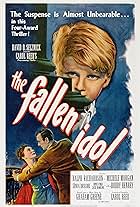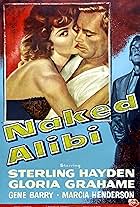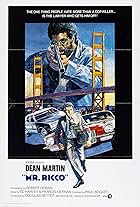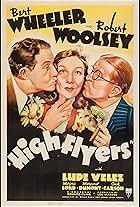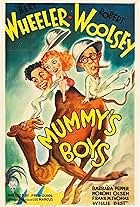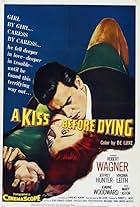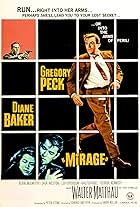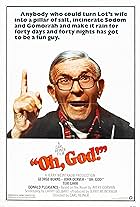Two out-of-work magicians help lovelorn Jerry adopt little Spanky. When Jerry makes up and elopes, the duo are stuck with the brat. Then Spanky inherits a fortune, so they all head to Kentuc... Read allTwo out-of-work magicians help lovelorn Jerry adopt little Spanky. When Jerry makes up and elopes, the duo are stuck with the brat. Then Spanky inherits a fortune, so they all head to Kentucky and get caught between two feuding clans.Two out-of-work magicians help lovelorn Jerry adopt little Spanky. When Jerry makes up and elopes, the duo are stuck with the brat. Then Spanky inherits a fortune, so they all head to Kentucky and get caught between two feuding clans.
George 'Spanky' McFarland
- Spanky Milford
- (as 'Spanky' McFarland)
Lucille La Verne
- Aunt Hannah Milfor
- (as Lucille LaVerne)
Willie Best
- Buckshot
- (as Sleep 'n' Eat)
Harry Bernard
- Destitute Man
- (uncredited)
Edgar Dearing
- Policeman
- (uncredited)
Jack A. Goodrich
- Double
- (uncredited)
William Gould
- One of the Milfords
- (uncredited)
Dorothy Granger
- Ethel - Baxter's Secretary
- (uncredited)
Storyline
Did you know
- TriviaThe $1,000 check Spanky tears up would equate to about $19,500 in 2019.
- ConnectionsFeatured in Hollywood the Golden Years: The RKO Story: Birth of a Titan (1987)
- SoundtracksOne Little Kiss
(1934) (uncredited)
Written by Bert Kalmar, Harry Ruby
Performed by Bert Wheeler, Noah Beery, George 'Spanky' McFarland,
Robert Woolsey, Mary Carlisle and negro servants
Featured review
Bert Wheeler and Robert Woolsey were one of many comedy teams to make it big during the early sound era. But unlike Laurel and Hardy or the Marx Brothers, their fame has not endured and their movies are not widely available today. Kentucky Kernels is a rare chance to see them at their prime.
The story and screenplay are by Bert Kalmar and Harry Ruby, the same duo who wrote many of the Marx Brothers' early hits, including Animal Crackers and Duck Soup. The fact that Kentucky Kernels features a slightly more conventional brand of humour shows how much of an influence the Marx Brothers had over their appearances. The early Marx Brothers comedies barely had any kind of story at all, because Groucho et al had such wild personalities they overshadowed the logic of plotting. By contrast Wheeler and Woolsey have slightly less exuberant comic personas and are able to work inside someone else's story. This is not a condemnation of the pair, simply an explanation of their difference in style.
Comparisons can be drawn however with other comedians of the era. Robert Woolsey has a little of Groucho in his wisecracking delivery, but also a touch of dour character actor Ned Sparks. Woolsey makes much play of his spectacles and his ever-present cigar, working these props into his aloof, confident comedy creation. Wheeler is more of the straight man, with some of the incompetent and effeminate qualities of Stan Laurel. However he is outwardly normal enough to take the part of a romantic lead in Kentucky Kernels. They are not a bad pairing, although they don't have quite the same dynamic as many of the more famous double acts.
The director for Kentucky Kernels was George Stevens, a graduate from the Hal Roach studios who would later make some very fine pictures. From the rather arty opening shots, it's clear Sevens had a burning desire to be a dramatic director. Stevens, a former cinematographer, had also worked informally as gag-man for Roach and there's no doubt he was a very funny man, but he was never actually that great a comedy director. As he always would, he doesn't stick to wide shots where you can see everything going on, and works a lot in close-up. It's a style that would work very well for him later on, but it doesn't lend itself very well to movies of this sort, as the comedy business becomes too disjointed.
The reason for Wheeler and Woolsey's lack of contemporary fame has been blamed on a number of things, a commonly cited example being their pictures not being reprised on TV in the 50s. However, it seems they weren't exactly phenomenally popular in the first place. Pictures like Kentucky Kernels would do a healthy trade, but they wouldn't get queues round the block. But all comparisons aside, this is still a fairly funny little movie. Our Gang member "Spanky" MacFarland pulls a number of cute and amusing poses. Noah Beery, a hammy version of his brother Wallace, is great fun here. Whether it comes from the writers Ruby and Kalmar, the ideas of cast members or the director, there is a cartoonishness to the humour that keeps things suitably silly. And, even though they may have been a somewhat second-rate pairing, Wheeler and Woolsey are able to provide us with a good many laughs.
The story and screenplay are by Bert Kalmar and Harry Ruby, the same duo who wrote many of the Marx Brothers' early hits, including Animal Crackers and Duck Soup. The fact that Kentucky Kernels features a slightly more conventional brand of humour shows how much of an influence the Marx Brothers had over their appearances. The early Marx Brothers comedies barely had any kind of story at all, because Groucho et al had such wild personalities they overshadowed the logic of plotting. By contrast Wheeler and Woolsey have slightly less exuberant comic personas and are able to work inside someone else's story. This is not a condemnation of the pair, simply an explanation of their difference in style.
Comparisons can be drawn however with other comedians of the era. Robert Woolsey has a little of Groucho in his wisecracking delivery, but also a touch of dour character actor Ned Sparks. Woolsey makes much play of his spectacles and his ever-present cigar, working these props into his aloof, confident comedy creation. Wheeler is more of the straight man, with some of the incompetent and effeminate qualities of Stan Laurel. However he is outwardly normal enough to take the part of a romantic lead in Kentucky Kernels. They are not a bad pairing, although they don't have quite the same dynamic as many of the more famous double acts.
The director for Kentucky Kernels was George Stevens, a graduate from the Hal Roach studios who would later make some very fine pictures. From the rather arty opening shots, it's clear Sevens had a burning desire to be a dramatic director. Stevens, a former cinematographer, had also worked informally as gag-man for Roach and there's no doubt he was a very funny man, but he was never actually that great a comedy director. As he always would, he doesn't stick to wide shots where you can see everything going on, and works a lot in close-up. It's a style that would work very well for him later on, but it doesn't lend itself very well to movies of this sort, as the comedy business becomes too disjointed.
The reason for Wheeler and Woolsey's lack of contemporary fame has been blamed on a number of things, a commonly cited example being their pictures not being reprised on TV in the 50s. However, it seems they weren't exactly phenomenally popular in the first place. Pictures like Kentucky Kernels would do a healthy trade, but they wouldn't get queues round the block. But all comparisons aside, this is still a fairly funny little movie. Our Gang member "Spanky" MacFarland pulls a number of cute and amusing poses. Noah Beery, a hammy version of his brother Wallace, is great fun here. Whether it comes from the writers Ruby and Kalmar, the ideas of cast members or the director, there is a cartoonishness to the humour that keeps things suitably silly. And, even though they may have been a somewhat second-rate pairing, Wheeler and Woolsey are able to provide us with a good many laughs.
Details
- Runtime1 hour 15 minutes
- Color
- Aspect ratio
- 1.37 : 1
Contribute to this page
Suggest an edit or add missing content

